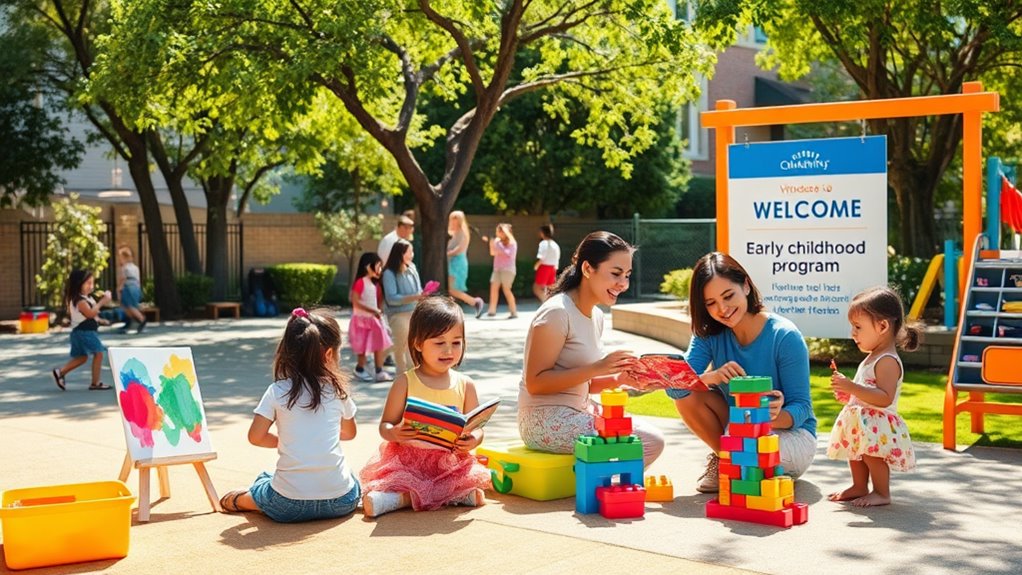Parental involvement in virtual learning is super important! When you're engaged, your child's success can skyrocket, leading to better grades and a positive attitude. By helping with assignments, you're building their confidence and creating a fun learning vibe at home. Plus, a little encouragement goes a long way in boosting motivation. You can also help them set up a distraction-free study space and establish a routine. Keeping in touch with teachers is key too, as it helps you stay updated on how your child is doing. Want to explore more tips on making virtual learning awesome?
Understanding Virtual Learning Dynamics
Virtual learning dynamics involve a unique set of challenges and opportunities that can considerably impact a student's educational experience. When you engage in virtual learning, you might feel like you're on a roller coaster. One minute, it's exciting; the next, it's a bit overwhelming.
You'll quickly notice that staying focused can be tough when your comfy bed is just a few steps away. Time management becomes your best friend. You've got to balance your schoolwork with all those distractions, like snacks and the latest video games.
Don't worry, though! You're not alone in this. Teachers are finding new ways to keep lessons engaging, like using fun videos and interactive quizzes.
On the flip side, learning from home means you might miss out on those spontaneous hallway chats with friends. But hey, technology can save the day! Video calls and online group projects can help you stay connected.
Embracing these changes can turn challenges into opportunities for growth. So, buckle up! You're on a journey that requires adaptability and creativity, but it can also be a lot of fun. Who knew learning could come with so many twists and turns?
Benefits of Parental Engagement
Parental engagement boosts a child's success in virtual learning environments. When you get involved, it shows your child that education matters. This support can lead to better grades, improved attendance, and a more positive attitude toward learning. Kids thrive when they know you're cheering them on!
Being engaged also helps you understand what your child is learning. You can ask them questions about their assignments, which builds their confidence and helps you connect. Plus, when you join in on discussions about schoolwork, it creates a fun learning atmosphere at home. It's like being a team in a game, working together for a win!
Let's not forget about the social side. Your involvement can help your child develop better communication skills. When they see you interacting with their teachers or peers, they learn how to express themselves, too.
And sometimes, a little humor goes a long way. A joke here and there can lighten the mood, making learning feel less like a chore.
Setting Up a Learning Environment
Creating a supportive learning environment at home sets the stage for your child's success in virtual learning. Start by choosing a quiet space for their study area—preferably away from distractions like TV and noisy siblings. Think of it as their special "learning zone," where they can focus and thrive.
Make sure this space is well-lit, comfortable, and stocked with all the supplies they'll need, like notebooks, pens, and maybe even a favorite stuffed animal for moral support. A little personalization can go a long way, so let them pick out a few decorations to make it feel inviting.
Establishing a routine is key, too. Kids thrive on structure, so set regular times for lessons, breaks, and even snack time. Speaking of snacks, keep healthy treats nearby to fuel their brain power.
Lastly, be nearby to offer help when they need it, but don't hover like a helicopter parent. Trust your child to tackle their tasks independently, while you cheer them on from the sidelines.
With the right environment, your child will be ready to conquer their virtual learning adventures!
Communicating With Educators
Establishing open lines of communication with your child's educators is essential for managing virtual learning effectively. It helps you stay in the loop and guarantees your child's needs are met. Don't hesitate to reach out! Email is great, but don't forget about online platforms like messaging apps or school portals. These tools can make communication quick and easy.
Ask questions about assignments, class activities, or your child's progress. Educators appreciate engaged parents, and it shows you're committed to your child's education. It's also a good idea to schedule regular check-ins with teachers. Even a quick chat can reveal helpful tips or resources that you mightn't know about.
Plus, it gives you a chance to share any concerns you might have.
And remember, communication goes both ways! If you notice changes in your child's mood or attitude towards learning, let the teacher know. They can provide support or adjust their approach.
Building a strong relationship with educators not only helps your child but also makes you feel more connected to their learning journey. So, pick up that virtual phone and start chatting—it's a win-win!
Monitoring Academic Progress
To effectively support your child's learning during virtual education, consistently monitoring their academic progress is essential. You'll want to keep an eye on how they're doing with their assignments, tests, and overall understanding of the material. It's like being a coach on the sidelines, cheering them on while also making sure they're practicing their skills!
Check their online platforms regularly. Most schools use tools where grades and feedback are posted. If you notice a dip in performance, don't panic! Instead, take it as an opportunity to chat with your child. Ask them what's tough or if they're feeling overwhelmed. Sometimes, it's just a matter of needing a little extra help or clarification.
Also, celebrate their successes! Acknowledging their hard work can boost their confidence and motivation. You can say things like, "Wow, you aced that math quiz! High-five!" This makes learning feel rewarding.
Lastly, connect with their teachers if you have questions. They're there to help and can provide valuable insights. By staying engaged and informed, you'll create a supportive environment that helps your child thrive in virtual learning.
After all, teamwork makes the dream work!
Encouraging Healthy Routines
In the midst of virtual learning, developing healthy routines can considerably boost your child's focus and well-being. Setting a consistent schedule helps create a sense of normalcy.
Start with a morning routine that includes breakfast, brushing teeth, and a few minutes of stretching. This can wake up their brain and body, making them ready to learn!
During study time, encourage short breaks every hour. A quick walk around the house or a dance party can recharge those batteries. It's amazing how a little movement can make a big difference in concentration!
Don't forget about meals! Nutritious snacks, like fruits or nuts, keep energy levels stable. And don't let them snack mindlessly in front of the screen; a designated snack time works wonders.
Also, creating a cozy, distraction-free workspace is key. Make it a fun spot with their favorite colors or inspiring quotes.
Finally, wind down in the evening with relaxing activities, like reading or family game time. This helps them unwind and prepares them for a good night's sleep.
Utilizing Educational Resources
Creating a structured routine sets the stage for effective learning, but it's equally important to incorporate a variety of educational resources that can enhance your child's experience. Think of these resources as tools in a toolbox! You wouldn't want to build a treehouse with just a hammer, right?
Explore online platforms that offer interactive lessons, games, and videos tailored to your child's grade level. Websites like Khan Academy or PBS Kids can make learning feel like playtime.
Don't forget about e-books and audiobooks! They can spark your child's imagination while keeping them engaged.
You can also check out local library resources, as many libraries offer digital lending services. That way, you can plunge into new worlds without leaving your couch!
Encouraging your child to use educational apps can also be a game-changer. They often turn tricky subjects into fun challenges.
Just remember to balance screen time with hands-on learning, like experiments or art projects. Mixing it up keeps things exciting and helps your child stay focused.
Fostering a Positive Mindset
How can you help your child develop a positive mindset during virtual learning? It's all about creating an encouraging environment. Start by celebrating small victories. Did they finish a tricky assignment? Give them a high-five or maybe a special treat! Positive reinforcement can work wonders.
Next, encourage them to embrace mistakes. Remind your child that everyone messes up sometimes—it's a part of learning! You might say, "Even famous inventors had their fair share of flops!" This helps them see failures as stepping stones rather than roadblocks.
Also, help them set achievable goals. Break down tasks into smaller, manageable chunks. When they accomplish one, they'll feel a sense of pride that boosts their confidence!
Lastly, keep the lines of communication open. Ask them about their day and listen to their feelings. Sharing their thoughts can lighten the load and help them feel supported.





